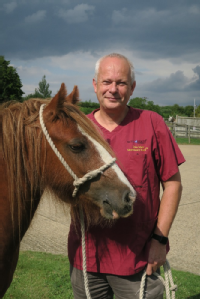VetTeamAMR Equine Launch Event

Date: Tuesday 6th June 2023
Opening times: 19.00
Venue: Free, Online via Zoom
Details
Hold your HPCIAs!
Responsible antibiotic use in equine practice, the oat-standing audit tool and learning platform you didn’t know you neigh-ded.
The VetTeamAMR Equine Audit Tool and Learning Platform launches on Tuesday 6 June 2023 at 7pm.
Participate in this special virtual event, which will feature expert speakers from around the world discussing critical topics within equine medicine and providing a demonstration of the VetTeamAMR tools and resources for equine practices. These include the VetTeamAMR Antimicrobial Audit Tool (an online, reflective audit system) and the VetTeamAMR Learning Platform (eLearning resources), created to support veterinary practices understand their antimicrobial prescribing behaviours and embed good antimicrobial stewardship. By taking a closer look at what antibiotics we are prescribing and why, we can improve our chances of keeping them working for when we really need them and tackle the growing threat of antimicrobial resistance (AMR).
The event is open to all vets, nurses and the wider practice team. Delegates must pre-register for the event via the link below.
Speakers
April Lawson, BVSc BSc CertAVP(EM) MSc DipECEIM FHEA MRCVS
April Lawson, from the University of Liverpool, will give an update on antimicrobial resistance in UK equine bacteriology submissions.
Antimicrobial resistance (AMR) in UK Equine bacteriology submissions.
This talk will cover an update on antimicrobial resistance (AMR) in UK equine bacteriology submissions. It will also cover the benefits of national reporting of laboratory bacteriology clinical submissions. These advantages include improved monitoring of emerging AMR and helping to guide antimicrobial use (AMU) policies/ local empirical therapy. We will also discuss ways that will improve the reliability and consistency of the bacteriology data reported by laboratories.
Biography
 April graduated from the University of Bristol and has also gained an intercalated degree in Pathology and Microbiology. She has worked in equine ambulatory practice, undertaken an equine hospital internship and completed a 3-year (2017-2020) residency in equine internal medicine. She has a master’s degree, Certificate in Advanced Veterinary Practice (Equine Medicine) and is a Diplomate of the European College of Equine Internal Medicine. April is based at the University of Liverpool; she is currently studying towards a PhD (entitled ‘Equine Veterinary Surveillance Network (EVSNET) for the UK horse population’) and she also has a clinical role as a Lecturer in Equine Medicine.
April graduated from the University of Bristol and has also gained an intercalated degree in Pathology and Microbiology. She has worked in equine ambulatory practice, undertaken an equine hospital internship and completed a 3-year (2017-2020) residency in equine internal medicine. She has a master’s degree, Certificate in Advanced Veterinary Practice (Equine Medicine) and is a Diplomate of the European College of Equine Internal Medicine. April is based at the University of Liverpool; she is currently studying towards a PhD (entitled ‘Equine Veterinary Surveillance Network (EVSNET) for the UK horse population’) and she also has a clinical role as a Lecturer in Equine Medicine.
Bruce Bladon, BVM&S, Cert EP, DESTS, Dipl ECVS, FRCVS, RCVS & European Specialist in Equine Surgery
Bruce Bladon, Hospital Director at Donnington Grove Veterinary Group in Newbury presents data on antimicrobial use in UK equine practices.
Measuring Antibiotic Usage in Equine Practice
Using a practice management software, we were able to record the amount of antibiotics used in 14 equine practices, treating up to 108,000 horses per year over ten years. This is likely to be in excess of 10% of the equine population of the UK. Antibiotics were grouped using the WHO criteria, into Important, Highly Important, Critically Important and Highest Priority Critically Important antibiotics. We recorded that the total use of antibiotics was between 60 and 46 mg/kg, with a mild reduction over ten years. This is comparable to the amount of antibiotics used in farm animal practice in 2013, but that sector has seen a rapid fall and has stabilised at 30mg/kg. The use of the mg/kg metric is not ideal in equine practice, with the widespread use of potentiated sulphonamides, with higher mg per daily dose than most other antibiotics. Two alternative metrics are the Defined Daily Dose per 1000 people and the Defined Daily Dose Vet per Animal per Year. Equine practice used 3.3 and 1.5 defined daily doses of antibiotics in 2021, substantially less than small animal practice (3.3 and 2.4 DDDVet/Animal/Year for dogs and cats respectively) and human medicine (18.2 DDD/1000 in UK in 2019). Highest Priority Critically Important antibiotic usage was low, at 0.6 mg/kg, 0.31 DDD/1000).
Biography
 Bruce Bladon graduated from Edinburgh University in 1988. He spent one year in mixed practice and then six years in two equine practices (Endell Veterinary Group in Salisbury and O’Gorman Slater and Main in Newbury), before joining Bristol University as Resident in Equine Surgery. He was awarded the Certificate of Equine Practice in 1992, the Diploma of Equine Soft Tissue Surgery in 1999 and Diploma of the European College of Veterinary Surgeons in 2001. He returned to Donnington Grove Veterinary Group (as it is now) in 1998, and is a Clinical Director. He has been recognised as a Specialist in Equine Surgery since 2000, and was awarded Fellowship of the Royal College of Veterinary Surgeons in 2016. He has lectured extensively, including to the British, South African, Australian, New Zealand, Dutch, Italian and Israeli Equine Veterinary Associations, international meetings in Brazil Canada, Spain, Germany and to the European and American Colleges of Veterinary Surgeons.
Bruce Bladon graduated from Edinburgh University in 1988. He spent one year in mixed practice and then six years in two equine practices (Endell Veterinary Group in Salisbury and O’Gorman Slater and Main in Newbury), before joining Bristol University as Resident in Equine Surgery. He was awarded the Certificate of Equine Practice in 1992, the Diploma of Equine Soft Tissue Surgery in 1999 and Diploma of the European College of Veterinary Surgeons in 2001. He returned to Donnington Grove Veterinary Group (as it is now) in 1998, and is a Clinical Director. He has been recognised as a Specialist in Equine Surgery since 2000, and was awarded Fellowship of the Royal College of Veterinary Surgeons in 2016. He has lectured extensively, including to the British, South African, Australian, New Zealand, Dutch, Italian and Israeli Equine Veterinary Associations, international meetings in Brazil Canada, Spain, Germany and to the European and American Colleges of Veterinary Surgeons.
Bruce is the principle equine surgeon at Donnington Grove Veterinary Surgery. The practice treats a large number of racing Thoroughbreds, but also has a substantial leisure horse population, including a large referral case load. The practice performs a significant number of scintigraphy bone scans and a very large number of MRI scans, using the Hallmarq® standing low field scanner. Bruce’s key interests are surgery, especially fracture repair and colic surgery, though he undertakes all procedures presented to him. He is also very involved with advanced imaging, particularly MRI. Bruce Bladon was Emergency Services Team Leader at the Rio 2016 Olympics.
Bruce is an eco warrior and drives a zero emissions vehicle. He is a (low level) rugby union referee. He can’t really run under 5 min per km pace anymore and can’t remotely keep up with his son (or wife). He does manage to squeeze in the occasional ski trip, but otherwise is not allowed out, and spends his time either in an operating theatre or looking at black and white images.
Gillian Perkins, DVM DACVIM
Gillian Perkins, from the College of Veterinary Medicine, Cornell University, discusses antimicrobial use in equine respiratory disease.
Does the coughing horse need antibiotics? A review of prudent use of antimicrobials in equine respiratory disease.
Empirical treatment with antimicrobials as a first step to the coughing horse is no longer in favor. An approach to the coughing adult horse and respiratory disorders will be discussed – with a focus on deciding what historical and physical examination findings indicate antibiotic therapy. Once a decision to treat with antibiotics has been made, what are the preferred choices, route and duration to minimise overall use and preserve critically important antimicrobials for humans.
Biography
 Dr. Perkins is a graduate of the Atlantic Veterinary College at the University of Prince Edward Island, Canada. She is a Diplomate of the American College of Veterinary Internal Medicine and is a Full Clinical Professor of Large Animal Internal Medicine at Cornell University. She was the Biosecurity Director at the Cornell University Hospital for Animals from 2012-2022. Her research has focused on infectious diseases evaluating the pathogenesis, immunity, and prevention of equine herpesvirus 1; antimicrobial resistance and control of salmonellosis. She teaches equine antimicrobial therapy to junior and senior veterinary students at Cornell using case examples and has an on-going project evaluating equine antimicrobial prescribing practices and developing an antimicrobial stewardship plan for the equine hospital at Cornell.
Dr. Perkins is a graduate of the Atlantic Veterinary College at the University of Prince Edward Island, Canada. She is a Diplomate of the American College of Veterinary Internal Medicine and is a Full Clinical Professor of Large Animal Internal Medicine at Cornell University. She was the Biosecurity Director at the Cornell University Hospital for Animals from 2012-2022. Her research has focused on infectious diseases evaluating the pathogenesis, immunity, and prevention of equine herpesvirus 1; antimicrobial resistance and control of salmonellosis. She teaches equine antimicrobial therapy to junior and senior veterinary students at Cornell using case examples and has an on-going project evaluating equine antimicrobial prescribing practices and developing an antimicrobial stewardship plan for the equine hospital at Cornell.
Nathan Slovis, DVM, Dipl. ACVIM, CHT
Nathan Slovis, Director of the McGee Medical Center at Hagyard Equine Medical Institute, Kentucky, discusses antimicrobial use and resistance in foals and the role of Rhodococcus equi.
Antimicrobial Resistance on Equine Farms: The Role of Rhodococcus equi
The World Health Organization recognizes the antimicrobial resistance in bacteria one of the greatest threats to human health. The overuse of antimicrobials in agricultural animal production and the consequent selective pressure has contributed to the buildup of resistant organisms in the environment. While the presence of resistant bacteria in hospitals is widely recognized, recent studies have documented antibiotic-resistant bacteria distributed more broadly in the environment, including water supplies and soil. Human and animal infection with resistant bacteria are challenging to treat and can impact survival.
Multidrug resistant (MDR)-R. equi has emerged in the environment of horse-breeding farms in Kentucky due to overuse of antimicrobials to prevent disease caused by R. equi in foals. Because MDR-R. equi leads to a higher probability of death in affected foals, it is necessary that we understand the effect of measures to reduce antimicrobial use in horse breeding farms. Specifically , the dynamics of MDR-R. equi populations to better predict the risk of infection of foals with MDR-R. equi and to develop strategies to control its spread between foals and farms. Widespread macrolide and rifampin resistance in R. equi isolates has become a major emerging problem facing the horse–breeding industry and might adversely impact human health.
Biography
 Dr. Nathan Slovis is the Director of the McGee Medical and Critical Care Center at the Hagyard Equine Medical Institute located in Lexington, Kentucky. He is a native of Annapolis, Maryland. He received his Bachelor of Science from Radford University, Doctor of Veterinary Medicine from Purdue University, interned at Arizona Equine Center and completed his residency in Internal Medicine at the University of California, Davis.
Dr. Nathan Slovis is the Director of the McGee Medical and Critical Care Center at the Hagyard Equine Medical Institute located in Lexington, Kentucky. He is a native of Annapolis, Maryland. He received his Bachelor of Science from Radford University, Doctor of Veterinary Medicine from Purdue University, interned at Arizona Equine Center and completed his residency in Internal Medicine at the University of California, Davis.
Dr. Slovis has published over 60 manuscripts in both national and international peer reviewed veterinary journals. He is the Editor of both the Atlas of Equine Endoscopy and The Atlas of Diseases/Disorders of the Foal both distributed by Elsevier. He implemented the current Infectious Disease and Equine Emergency Response Programs at Hagyard Equine Medical Institute and holds the position of Infectious Disease Officer He is also a Certified Hyperbaric Technologist for humans and animals.
Tim Mair, RCVS Knowledge Equine Clinical Lead, BVSc PhD DEIM DipECEIM DESTS FRCVS
Tim Mair will present and demonstrate the VetTeamAMR Antimicrobial Audit Tool and the Learning Platform.
Biography
 Tim is Equine Clinical Lead for VetTeamAMR. He also works as a clinician at the Bell Equine Veterinary Clinic in Kent and is Equine Veterinary Director of the CVS Group. His clinical interests include equine internal medicine, soft tissue surgery and advanced imaging. He is a past President of the British Equine Veterinary Association and is Editor-in-Chief of Equine Veterinary Education. He is a previous trustee of RCVS Knowledge and is passionate about clinical research, Quality Improvement. evidence-based medicine and environmental sustainability.
Tim is Equine Clinical Lead for VetTeamAMR. He also works as a clinician at the Bell Equine Veterinary Clinic in Kent and is Equine Veterinary Director of the CVS Group. His clinical interests include equine internal medicine, soft tissue surgery and advanced imaging. He is a past President of the British Equine Veterinary Association and is Editor-in-Chief of Equine Veterinary Education. He is a previous trustee of RCVS Knowledge and is passionate about clinical research, Quality Improvement. evidence-based medicine and environmental sustainability.
For more information about the audit tool and the education platform, please visit our website or email [email protected].